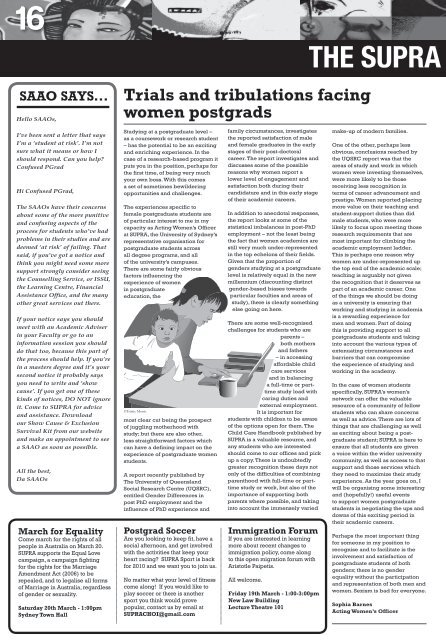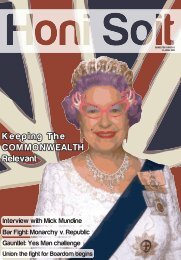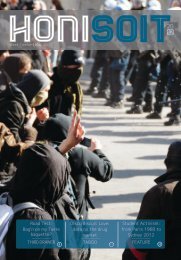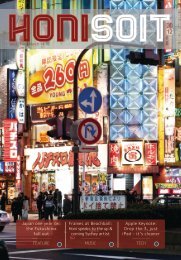Confessions of a BAD Vegetarian - Students Representative Council ...
Confessions of a BAD Vegetarian - Students Representative Council ...
Confessions of a BAD Vegetarian - Students Representative Council ...
Create successful ePaper yourself
Turn your PDF publications into a flip-book with our unique Google optimized e-Paper software.
16<br />
SAAO SAYS...<br />
Hello SAAOs,<br />
I’ve been sent a letter that says<br />
I’m a ‘student at risk’. I’m not<br />
sure what it means or how I<br />
should respond. Can you help?<br />
Confused PGrad<br />
Hi Confused PGrad,<br />
The SAAOs have their concerns<br />
about some <strong>of</strong> the more punitive<br />
and confusing aspects <strong>of</strong> the<br />
process for students who’ve had<br />
problems in their studies and are<br />
deemed ‘at risk’ <strong>of</strong> failing. That<br />
said, if you’ve got a notice and<br />
think you might need some more<br />
support strongly consider seeing<br />
the Counselling Service, or ISSU,<br />
the Learning Centre, Financial<br />
Assistance Office, and the many<br />
other great services out there.<br />
If your notice says you should<br />
meet with an Academic Adviser<br />
in your Faculty or go to an<br />
information session you should<br />
do that too, because this part <strong>of</strong><br />
the process should help. If you’re<br />
in a masters degree and it’s your<br />
second notice it probably says<br />
you need to write and ‘show<br />
cause’. If you get one <strong>of</strong> these<br />
kinds <strong>of</strong> notices, DO NOT ignore<br />
it. Come to SUPRA for advice<br />
and assistance. Download<br />
our Show Cause & Exclusion<br />
Survival Kit from our website<br />
and make an appointment to see<br />
a SAAO as soon as possible.<br />
All the best,<br />
Da SAAOs<br />
March for Equality<br />
Come march for the rights <strong>of</strong> all<br />
people in Australia on March 20.<br />
SUPRA supports the Equal Love<br />
campaign, a campaign fighting<br />
for the rights for the Marriage<br />
Amendment Act (2006) to be<br />
repealed, and to legalise all forms<br />
<strong>of</strong> Marriage in Australia, regardless<br />
<strong>of</strong> gender or sexuality.<br />
Saturday 20th March - 1:00pm<br />
Sydney Town Hall<br />
Trials and tribulations facing<br />
women postgrads<br />
Studying at a postgraduate level –<br />
as a coursework or research student<br />
– has the potential to be an exciting<br />
and enriching experience. In the<br />
case <strong>of</strong> a research-based program it<br />
puts you in the position, perhaps for<br />
the first time, <strong>of</strong> being very much<br />
your own boss. With this comes<br />
a set <strong>of</strong> sometimes bewildering<br />
opportunities and challenges.<br />
The experiences specific to<br />
female postgraduate students are<br />
<strong>of</strong> particular interest to me in my<br />
capacity as Acting Women’s Officer<br />
at SUPRA, the University <strong>of</strong> Sydney’s<br />
representative organisation for<br />
postgraduate students across<br />
all degree programs, and all<br />
<strong>of</strong> the university’s campuses.<br />
There are some fairly obvious<br />
factors influencing the<br />
experience <strong>of</strong> women<br />
in postgraduate<br />
education, the<br />
©Trinity Morris<br />
most clear cut being the prospect<br />
<strong>of</strong> juggling motherhood with<br />
study; but there are also other,<br />
less straightforward factors which<br />
can have a defining impact on the<br />
experience <strong>of</strong> postgraduate women<br />
students.<br />
A report recently published by<br />
The University <strong>of</strong> Queensland<br />
Social Research Centre (UQSRC),<br />
entitled Gender Differences in<br />
post PhD employment and the<br />
influence <strong>of</strong> PhD experience and<br />
Postgrad Soccer<br />
Are you looking to keep fit, have a<br />
social afternoon, and get involved<br />
with the activities that keep your<br />
heart racing? SUPRA Sport is back<br />
for 2010 and we want you to join us.<br />
No matter what your level <strong>of</strong> fitness<br />
come along! If you would like to<br />
play soccer or there is another<br />
sport you think would prove<br />
popular, contact us by email at<br />
SUPRACHOI@gmail.com<br />
family circumstances, investigates<br />
the reported satisfaction <strong>of</strong> male<br />
and female graduates in the early<br />
stages <strong>of</strong> their post-doctoral<br />
career. The report investigates and<br />
discusses some <strong>of</strong> the possible<br />
reasons why women report a<br />
lower level <strong>of</strong> engagement and<br />
satisfaction both during their<br />
candidature and in this early stage<br />
<strong>of</strong> their academic careers.<br />
In addition to anecdotal responses,<br />
the report looks at some <strong>of</strong> the<br />
statistical imbalances in post-PhD<br />
employment – not the least being<br />
the fact that women academics are<br />
still very much under-represented<br />
in the top echelons <strong>of</strong> their fields.<br />
Given that the proportion <strong>of</strong><br />
genders studying at a postgraduate<br />
level is relatively equal in the new<br />
millennium (discounting distinct<br />
gender-based biases towards<br />
particular faculties and areas <strong>of</strong><br />
study), there is clearly something<br />
else going on here.<br />
There are some well-recognised<br />
challenges for students who are<br />
parents –<br />
both mothers<br />
and fathers<br />
– in accessing<br />
affordable child<br />
care services<br />
and in balancing<br />
a full-time or parttime<br />
study load with<br />
caring duties and<br />
external employment.<br />
It is important for<br />
students with children to be aware<br />
<strong>of</strong> the options open for them. The<br />
Child Care Handbook published by<br />
SUPRA is a valuable resource, and<br />
any students who are interested<br />
should come to our <strong>of</strong>fices and pick<br />
up a copy. There is undoubtedly<br />
greater recognition these days not<br />
only <strong>of</strong> the difficulties <strong>of</strong> combining<br />
parenthood with full-time or parttime<br />
study or work, but also <strong>of</strong> the<br />
importance <strong>of</strong> supporting both<br />
parents where possible, and taking<br />
into account the immensely varied<br />
Immigration Forum<br />
If you are interested in learning<br />
more about recent changes to<br />
immigration policy, come along<br />
to this open migration forum with<br />
Aristotle Paipetis.<br />
All welcome.<br />
Friday 19th March - 1:00-3:00pm<br />
New Law Building<br />
Lecture Theatre 101<br />
THE SUPRA P<br />
make-up <strong>of</strong> modern families.<br />
One <strong>of</strong> the other, perhaps less<br />
obvious, conclusions reached by<br />
the UQSRC report was that the<br />
areas <strong>of</strong> study and work in which<br />
women were investing themselves,<br />
were more likely to be those<br />
receiving less recognition in<br />
terms <strong>of</strong> career advancement and<br />
prestige. Women reported placing<br />
more value on their teaching and<br />
student-support duties than did<br />
male students, who were more<br />
likely to focus upon meeting those<br />
research requirements that are<br />
most important for climbing the<br />
academic employment ladder.<br />
This is perhaps one reason why<br />
women are under-represented up<br />
the top end <strong>of</strong> the academic scale;<br />
teaching is arguably not given<br />
the recognition that it deserves as<br />
part <strong>of</strong> an academic career. One<br />
<strong>of</strong> the things we should be doing<br />
as a university is ensuring that<br />
working and studying in academia<br />
is a rewarding experience for<br />
men and women. Part <strong>of</strong> doing<br />
this is providing support to all<br />
postgraduate students and taking<br />
into account the various types <strong>of</strong><br />
extenuating circumstances and<br />
barriers that can compromise<br />
the experience <strong>of</strong> studying and<br />
working in the academy.<br />
In the case <strong>of</strong> women students<br />
specifically, SUPRA’s women’s<br />
network can <strong>of</strong>fer the valuable<br />
resource <strong>of</strong> a community <strong>of</strong> fellow<br />
students who can share concerns<br />
as well as advice. There are lots <strong>of</strong><br />
things that are challenging as well<br />
as exciting about being a postgraduate<br />
student; SUPRA is here to<br />
ensure that all students are given<br />
a voice within the wider university<br />
community, as well as access to that<br />
support and those services which<br />
they need to maximize their study<br />
experience. As the year goes on, I<br />
will be organising some interesting<br />
and (hopefully!) useful events<br />
to support women postgraduate<br />
students in negotiating the ups and<br />
downs <strong>of</strong> this exciting period in<br />
their academic careers.<br />
Perhaps the most important thing<br />
for someone in my position to<br />
recognise and to facilitate is the<br />
involvement and satisfaction <strong>of</strong><br />
postgraduate students <strong>of</strong> both<br />
genders; there is no gender<br />
equality without the participation<br />
and representation <strong>of</strong> both men and<br />
women. Sexism is bad for everyone.<br />
Sophia Barnes<br />
Acting Women’s Officer






